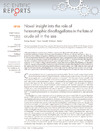Please use this identifier to cite or link to this item:
https://accedacris.ulpgc.es/jspui/handle/10553/75423
| Title: | Novel insight into the role of heterotrophic dinoflagellates in the fate of crude oil in the sea | Authors: | Almeda, Rodrigo Connelly, T.L Buskey, E. |
UNESCO Clasification: | 251001 Oceanografía biológica | Issue Date: | 2014 | Journal: | Scientific Reports | Abstract: | Although planktonic protozoans are likely to interact with dispersed crude oil after a spill, protozoan-mediated processes affecting crude oil pollution in the sea are still not well known. Here, we present the first evidence of ingestion and defecation of physically or chemically dispersed crude oil droplets (1–86 μm in diameter) by heterotrophic dinoflagellates, major components of marine planktonic food webs. At a crude oil concentration commonly found after an oil spill (1 μL L−1), the heterotrophic dinoflagellates Noctiluca scintillans and Gyrodinium spirale grew and ingested ~0.37 μg-oil μg-Cdino−1 d−1, which could represent ~17% to 100% of dispersed oil in surface waters when heterotrophic dinoflagellates are abundant or bloom. Egestion of faecal pellets containing crude oil by heterotrophic dinoflagellates could contribute to the sinking and flux of toxic petroleum hydrocarbons in coastal waters. Our study indicates that crude oil ingestion by heterotrophic dinoflagellates is a noteworthy route by which petroleum enters marine food webs and a previously overlooked biological process influencing the fate of crude oil in the sea after spills. | URI: | https://accedacris.ulpgc.es/handle/10553/75423 | ISSN: | 2045-2322 | DOI: | 10.1038/srep07560 | Source: | Scientific Reports [EISSN 2045-2322], v. 4, 7560 |
| Appears in Collections: | Artículos |
WEB OF SCIENCETM
Citations
39
checked on Feb 15, 2026
Page view(s)
69
checked on Jan 10, 2026
Download(s)
63
checked on Jan 10, 2026
Google ScholarTM
Check
Altmetric
Share
Export metadata
Items in accedaCRIS are protected by copyright, with all rights reserved, unless otherwise indicated.
